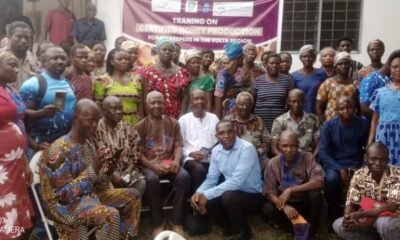Editorial
Let’s address streetism together
Streetism in Ghana is becoming a serious problem that requires immediate attention to prevent it from getting worse.
These days, it is common to see mothers relaxing in the shade as their children as young as two years stroll along the streets begging for alms from oncoming vehicles and onlookers.
This typically occurs around busy intersections and thoroughfares, like the ring road, the Kwame Nkrumah Circle area, the Atomic Junction roundabout, and the airport area, among others.
Every day, more and more children are discovered living on the streets. This is unsafe and starting to become an annoyance, therefore action needs to be taken to stop the situation from getting worse.
The United Nations estimates that around 61,492 people under the age of 18 are on the streets in the Greater Accra region of Ghana alone.
Even though there has been progress in offering assistance and services to homeless children, there is still much work to be done to completely eradicate the issue.
In fact, a number of reasons have contributed to this threat, including the challenging socioe-economic conditions that families are facing, rising urbanisation, poverty, a lack of family support, divorce, family violence, low levels of education, and single parenting.
These children are more vulnerable to malnourishment, illness, and injury since they often do not have access to basic needs such as clothing, food, shelter, and healthcare. They are exposed to harsh weather, which frequently results in a range of ailments and health issues.
According to research, children who grow up on the streets are often the ones who take up social vices including drug addiction, prostitution, armed robbery, and other similar behaviours.
The Spectator believes that public education should be used to raise awareness of streetism’s detrimental effects on children’s development in order to combat it.
Furthermore, in order to effectively combat streetism, we implore the government, churches, Non-Governmental Organisations (NGOs), the community, and philanthropists, among others, to grant access to social services.
In light of this, The Spectator praises the government for recently cutting the sod to allow for the development of a two-storey facility that will offer comprehensive care for street children in the nation’s capital.
The “Mother Teresa Soup Kitchen” (MTSK) is intended to provide the impoverished and homeless children living on Accra’s streets with at least one healthy meal per day in addition to counselling and skill development.
“This project hopes to take children off the street starting from this very community and propel it nationwide,” Vice President Dr. Mahamudu Bawumia stated when he cut the sod for the project,
He continued, “When this project takes off, Mother Teresa Soup Kitchen will be the biggest action by a private individual and an NGO against the menace of street children in Ghana.”
Let us work together to combat streetism throughout the nation.
Editorial
To all Muslims, happy Eid ul Adha!
Muslims in Ghana joined the world yesterday to observe the Eid-ul-Adha; the second of the two main festivals in Islam.
Eid-ul-Adha takes place on the 10th of Dhu al-Hijja, the twelfth and last month of the Islamic calendar, and is also referred to as the “Festival of the Sacrifice.”
It symbolises Prophet Ibrahim’s (Abraham’s) readiness to offer his son as a sacrifice in response to Allah’s instruction.
In addition to making sacrifices, the celebration aims to spread unity, love, joy, and compassion.
In Ghana, people celebrated the day with special prayers, feasts, and the customary killing of an animal and sharing the flesh with their loved ones, neighbours, and the underprivileged.
During the celebration of the festival Muslims gather at mosques or open areas for congregational prayers early in the morning. After the prayers, people visit each other, exchange gifts, and enjoy festive meals.
One aspect of the celebration is the wearing of traditional Islamic clothing, such as kaftans, jalabiyas, and abayas, which are in high demand and cause prices to rise sharply during this time.
Abayas and jalabiyas, which are frequently imported from Turkey, Dubai, Egypt, and Northern Nigeria, have become very popular clothing items, leading to price increases, according to reports from our Northern Regional Correspondent.
“Some customers complain about the cost, but many still go ahead and buy because it’s Ramadan,” a store owner said.
However, as there is no set attire for the festival, many Muslims opted for modest, loose-fitting clothing that embodies Islamic principles.
The Spectator, believes that since the celebration is a wonderful occasion and Muslims want to feel happy throughout the festivities, the traditional attire should be reasonably priced so that others can celebrate in style.
We are glad that the holy month is still a precious time despite the economic strains, and that some people make the day extra special for their loved ones.
Despite the hectic preparations the emphasis should always be on appreciating the event’s profound spiritual meaning.
Happy Eid ul Adha to all Muslims.
Editorial
Review GTC’s ban on noise-making
Dear Editor,
I write to express my concerns regarding the annual ban on noise-making instituted by the Ga Traditional Council (GTC) and its impact on Christian churches and other religious institutions.
While I acknowledge and respect the cultural significance of this period for the Ga people, it is important to highlight the challenges it poses to churches within the Greater Accra Region.
The restrictions often affect worship services, prayer meetings, and other religious activities that rely on instruments and singing as core parts of worship. In some cases, churches are compelled to suspend midweek services or modify their mode of worship entirely.
It is important that cultural and religious practices coexist peacefully in a pluralistic society. Mutual respect and dialogue should be encouraged so that neither traditional authorities nor religious institutions felt marginalised.
I respectfully suggest that the Ga Traditional Council, in collaboration with the Christian Council and other faith-based groups, consider establishing clear, fair, and mutually agreeable guidelines that allow worship to continue in a way that respects traditional observances.
Peaceful coexistence is possible when there is open dialogue, understanding, and respect for all cultures and beliefs. Let us work together toward solutions that promote unity and harmony in our communities.
Eugene Ampiaw
Accra-Mamprobi







